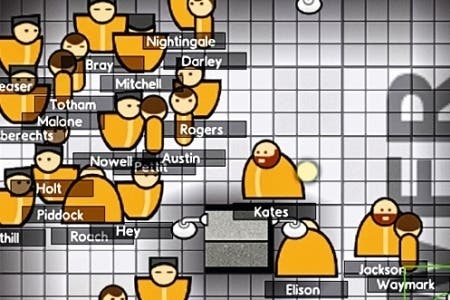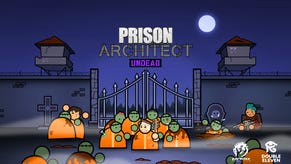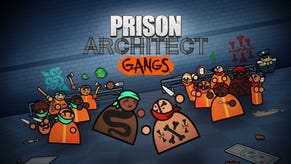Hard time with the Prison Architect alpha
It made $100k in three days, but what's life like behind bars with Introversion's latest?
Ever been to prison? No? Me neither. The closest I've come to hard time was probably the first night of my school exchange programme in Germany. They were a very nice family, don't get me wrong, and I'm sure they meant well, but in hindsight I have to question their decision to dump me in a basement guestroom, because all I had to keep me company from 8pm until the morning was a series of bizarre mechanical clanking noises and one tiny window near the ceiling. Oh, and a strangely reddened copy of Stephen King's "Misery". Eat your heart out, Tim Robbins.
So I don't know much about prisons, and that's evident from my first six or seven hours playing Prison Architect. My save game folder is littered with unfinished facilities, all of which started brightly and then fell apart quickly as I struggled to scale them to match the influx of new prisoners or cope with ever-diminishing funds.
There's Unshawshank, where I built loads of rooms and then realised they were too small to act as holding cells or offices. There's Pentonfail, where I built a storage room too far from food deliveries and the kitchen/canteen, leading to huge lead times for meals and inevitable violence. And there's Unleavenedworth, where I tried to anticipate my future needs by building giant, immaculate cell blocks... and then ran out of funds.
So I guess I still don't know much about prisons, but I am learning. And it's inevitable that there's a lot of trial and error - the Prison Architect alpha, which is available now if you pledge $30 or more towards the game's ongoing development, only provides one mission from the promised campaign mode, so once you've completed that it's straight into the sandbox, and the sandbox is pretty intimidating.
Even the basics aren't super obvious. You have to lay down foundations, then install an entrance, then build interior walls, then assign room functions, then populate rooms with required objects, then hire staff, and so on. That's complex enough, but it's only once you've gotten your head around these things that you realise you should have been thinking about other things first, like where buildings and utilities are going to sit in relation to one another and to the main road, which is where supplies and prisoners are delivered.
Prisoners arrive in hefty groups every 24 hours, and the tips you were given during the initial campaign introduction don't equip you terribly well either to cope with their needs or to imagine how the challenge will scale. It's suggested that you set up a holding cell, a kitchen, a canteen and a shower room, but that's about all there is for guidance, and you seem to run low on funds very quickly. All too often you stare at what you have, frown, and reach again for Create New Prison from the main menu.
Fortunately, the Prison Architect alpha has really taken off, doing over $100k of business in less than a week, and that means you're not alone with your troubles. If you head to the online wiki (available to alpha members) you'll find a helpful tutorial and lots of useful tips. For example, you discover that if you click the Reports button in the bottom-right of the game screen and go to the Grants tab then you can immediately increase your funds to over $90,000 from $9950. This makes a considerable difference, but it isn't mentioned in the game at the moment unless you discover it by chance.
The wiki and forum are growing all the time as players experiment with the many interwoven game systems that programmer Chris Delay has composed, and as the documentation improves so does your ability to plan your way through the sandbox mode. I'm on my eighth or ninth prison, and this one began with centralised storage, power and water provision, ample food and hygiene facilities, plenty of individual cells (as opposed to troublesome holding pens) and lots and lots of windows. Suddenly the routing for staff and guards is more efficient and prisoners are more sedate in general.
Getting the player to understand basic stuff like this is what Introversion traditionally struggles to do with its games, so the alpha development model should be really helpful in the long run. There are already numerous usability issues in the alpha that could do with attention - like the Objects menu, which currently displays 35 icons in an apparently random order that makes it really hard to identify the thing you need. If Introversion was developing Prison Architect in isolation, you can imagine that menu making it into the shipping version unchanged. With alpha testers like me feeding back on it, the developers can consider whether to alter it before then rather than assuming that it's fine.
Indeed, with alpha testers feeding back on the bits Introversion usually struggles with, Chris Delay and his colleagues can focus on what they are usually brilliant at: developing the systems. There's already talk of adding large-scale riots, organised escape attempts, and other events that will force you to think about managing your penitentiary as well as just building it. I'd much rather Introversion was working on stuff like that than trying to figure out where their game needs a bit more explaining.
Delay loves designing and playing with systems - to the point where he freely admits he sometimes loses sight of how to bring them together into an entertaining game, as happened with the aborted Subversion. Having thousands of people tinkering alongside him this time, feeding back into the creative process, could help elevate Prison Architect into a really fantastic management simulation. For now, it's yet another entertaining oddity from one of the UK's most interesting indie developers.








